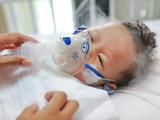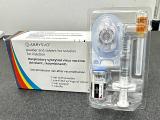Two recent studies show the potential severity of respiratory syncytial virus (RSV) infections in adults. In a new study published in Influenza and Other Respiratory Viruses, researchers found that adults hospitalized for RSV infection had a significantly higher risk of in-patient mortality and adverse respiratory and kidney outcomes than those hospitalized for flu.
In a second study published in Clinical Infectious Diseases, RSV hospitalization was tied to an increased risk of cardiovascular events, particularly in patients with comorbidities.
60% of RSV patients develop bacterial pneumonia
The first study compared outcomes among hospitalized adults across Hong Kong from 2016 through 2023. In-patient mortality, severe respiratory failure (SRF), secondary bacterial pneumonia, and acute kidney injury (AKI) were compared among adults hospitalized for influenza and RSV.
Altogether, 41,206 and 3,565 patients were hospitalized for flu and RSV, respectively, during the study. Patients with RSV infections were older, had more underlying conditions, and were more likely to be men.
Mortality was higher in the RSV cohort, with a 10.1% death rate, compared to 5.5% for flu. RSV infection showed a 52% higher risk of death during hospitalization (adjusted odds ratio [aOR] 1.52; 95% CI ,1.13 to 2.05).
Likewise, secondary bacterial pneumonia rates were significantly higher in the RSV group (61.5% vs 39.5%), as was AKI (16.0% vs 12.6%).
Flu vaccination, which was much more widely available during the study period, was protective against all severe outcomes for those hospitalized with flu.
Our present data provide strong evidence on the clinical impact of RSV infection in adults and vulnerable populations and thus call for a revisit on the vaccination recommendations for RSV among adults.
"The incidence and risks of death during hospitalization, SRF, and secondary bacterial pneumonia were significantly higher among RSV patients when compared with unvaccinated influenza patients," the authors wrote. "Our present data provide strong evidence on the clinical impact of RSV infection in adults and vulnerable populations and thus call for a revisit on the vaccination recommendations for RSV among adults."
Congestive heart failure most common cardiac outcome
The second study was a retrospective analysis of hospitalized patients with confirmed RSV in Rochester, New York, during the 2017-18 through 2019-2020 winter seasons. While the increased risk of cardiovascular issues following influenza has been well-documented, less is known about how much risk RSV infections carry.
Of the 471 adults hospitalized with RSV, 37% experienced cardiovascular events (CVEs) within 28 days of admission, for a total of 270 independent CVEs. Eighty-eight percent of events happened within 7 days of admission.
The most common CVEs were congestive heart failure (CHF, 25%), atrial fibrillation (AF, 13%), and myocardial infarction (MI, 9%). Compared to pre-hospitalization, the incidence rate ratio of CVEs was 18.5 and 1.6 during the high-risk and late-risk periods (6 months following hospitalization).
Overall outcomes were much worse for patients with CVEs compared to those without, with the study authors noting higher intensive care unit use (22.4% vs 9.8%) and ventilatory support (17.2% vs 5.7%).
Older age and three or more cardiac risk factors appeared to predispose patients to CVEs during 28 days from hospitalization, the authors said.
"However, a substantial proportion of hospitalized patients had new onset CHF, AF and MI and maybe unaware of their risk of cardiac complications with viral respiratory infection," they concluded. "These data can help clinicians assist their patients in assessing the risk and benefits of the approved adult RSV vaccines."


















